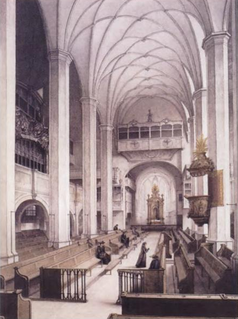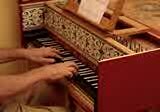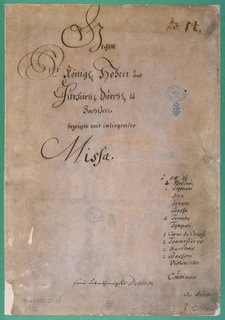
The mass, a form of sacred musical composition, is a choral composition that sets the invariable portions of the Eucharistic liturgy to music. Most masses are settings of the liturgy in Latin, the liturgical sacred language of the Catholic Church's Roman liturgy, but there are a significant number written in the languages of non-Catholic countries where vernacular worship has long been the norm. For example, there are many masses written in English for the Church of England. Musical masses take their name from the Catholic liturgy called "the mass" as well.

Wilhelm Friedemann Bach, the second child and eldest son of Johann Sebastian Bach and Maria Barbara Bach, was a German composer and performer. Despite his acknowledged genius as an organist, improviser and composer, his income and employment were unstable and he died in poverty.

The Mass in B minor by Johann Sebastian Bach is a musical setting of the complete Ordinary of the Latin Mass. The work was one of Bach's last compositions, not completed until 1749, the year before his death. To complete the work, in the late 1740s Bach composed new sections of the Credo such as Et incarnatus est.

Klavierbüchlein für Wilhelm Friedemann Bach is a collection of keyboard music compiled by the German Baroque composer Johann Sebastian Bach for his eldest son Wilhelm Friedemann. It is frequently referred to simply as Klavierbüchlein.

The Chronicle of Anna Magdalena Bach is a 1968 film by the French filmmaking duo of Jean-Marie Straub and Danièle Huillet. It was their first full-length feature film, and reportedly took a decade to finance. The film stars renowned harpsichordist Gustav Leonhardt as Johann Sebastian Bach and Christiane Lang as Anna Magdalena Bach. The orchestral music was performed by Concentus Musicus and conducted by Nikolaus Harnoncourt. It is the first of several Straub-Huillet films to be based on works of classical music. The film was entered into the 18th Berlin International Film Festival.

Johann Sebastian Bach was a German composer and musician of the Baroque period. He is known for instrumental compositions such as the Art of Fugue, the Brandenburg Concertos, and the Goldberg Variations, and for vocal music such as the St Matthew Passion and the Mass in B minor. Since the 19th-century Bach Revival he has been generally regarded as one of the greatest composers of the Western art musical canon.

Gloria in excelsis Deo, BWV 191, is a church cantata written by the German Baroque composer Johann Sebastian Bach, and the only one of his church cantatas set to a Latin text. He composed the Christmas cantata in Leipzig probably in 1745 to celebrate the end of the Second Silesian War on Christmas Day. The composition's three movements all derive from the Gloria of an earlier Missa written by Bach in 1733 for the Dresden court, which the composer would later use as the Gloria of his Mass in B minor.

Johann Sebastian Bach composed the church cantata Herr, deine Augen sehen nach dem Glauben, BWV 102 in Leipzig for the tenth Sunday after Trinity and first performed on 25 August 1726.
Most of Johann Sebastian Bach's extant church music in Latin —settings of the Mass ordinary and the Magnificat— dates from his Leipzig period (1723–50). Bach started to assimilate and expand compositions on a Latin text by other composers before his tenure as Thomaskantor in Leipzig, and he continued to do so after he had taken up that post. The text of some of these examples by other composers was a mixture of German and Latin: also Bach contributed a few works employing both languages in the same composition, for example his early Kyrie "Christe, du Lamm Gottes".

The Chor von St. Bonifatius is a German mixed choir, the church choir of the parish St. Bonifatius, Wiesbaden. It was founded in 1862 as a male choir and was a mixed choir from 1887. From 1981 to 2018, it was conducted by Gabriel Dessauer, who founded two children's choirs. The group sang the first performance in Germany of John Rutter's Mass of the Children and performed in Azkoitia, San Sebastián, Görlitz, Bruges, Macon and Rome. Colin Mawby composed for the choir the Missa solemnis Bonifatius-Messe for the 150th anniversary, celebrated on 3 October 2012. From 2019, the choir has been conducted by Roman Twardy who conducted in his first concert Dvořák's Stabat Mater.

Twelve Little Preludes, BWV 924–930, 939–942 and 999, is a 19th-century compilation of short pieces, collected from various 18th-century manuscripts written by Johann Sebastian Bach and others. Notwithstanding their diverse origin and characteristics they were published as a set of twelve keyboard preludes by Bach, in, amongst others, the 36th volume of the Bach-Gesellschaft Ausgabe (BGA).

Johann Sebastian Bach's output include two types of organ concertos:
Prelude and Fugue in E minor, BWV 855, is the 10th prelude and fugue for keyboard (harpsichord) in the first book of The Well Tempered Clavier, composed in 1722 by Johann Sebastian Bach. The Prelude in E minor, BWV 855a, features as No. 18 ("Praeludium 5") in the 1720 Klavierbüchlein für Wilhelm Friedemann Bach. BWV 855a may also refer to both this Prelude and a Fughetta in the same key, an early version of BWV 855. Alexander Siloti made a piano arrangement in B minor of the Prelude BWV 855a.
This page is based on this
Wikipedia article Text is available under the
CC BY-SA 4.0 license; additional terms may apply.
Images, videos and audio are available under their respective licenses.













